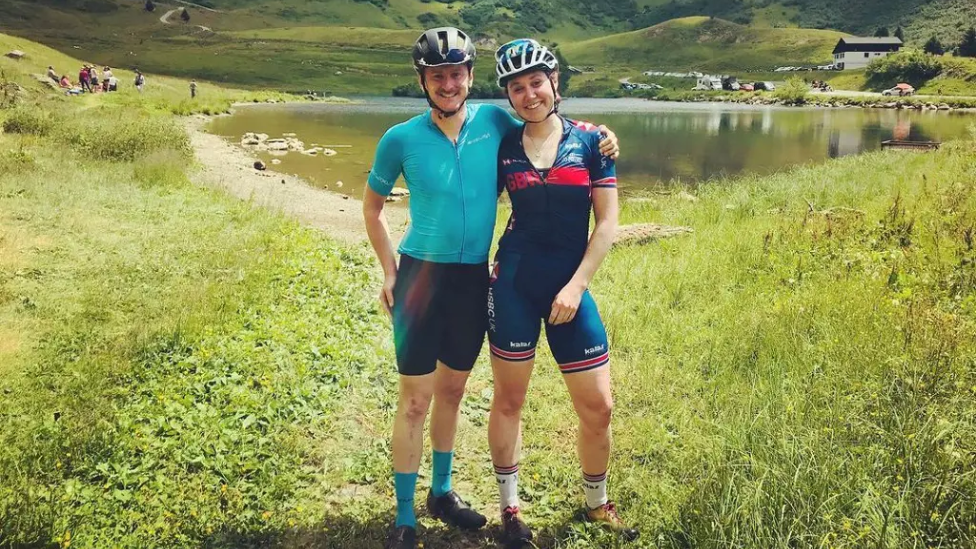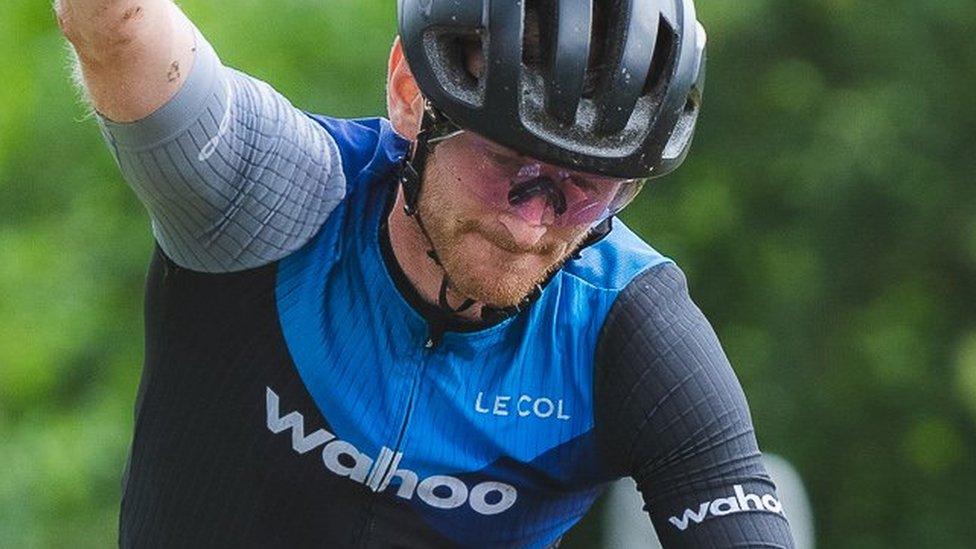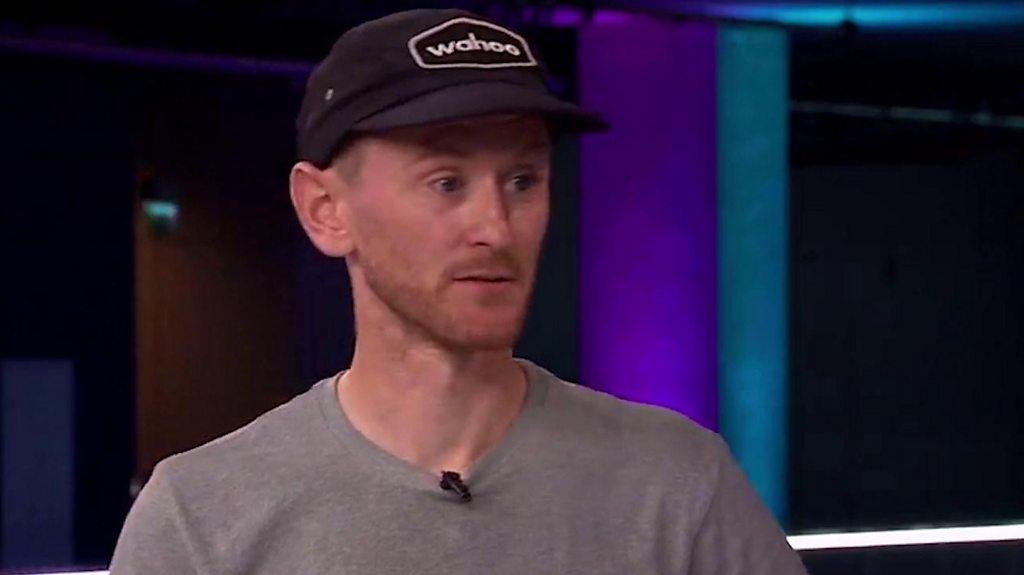Olympian Katie Archibald tried to save dying partner Rab Wardell
- Published

Katie Archibald has spoken of her devastation following the death of partner Rab Wardell
Olympian Katie Archibald said she tried desperately to save her partner Rab Wardell as he suffered a fatal cardiac arrest in bed beside her.
The champion cyclist expressed her devastation after Wardell, a mountain biker, died aged 37 on Tuesday morning.
His death came two days after he won the Scottish MTB XC Championships in Dumfries and Galloway.
Archibald, 28, made an emotional statement in a social media post on Wednesday morning.
She tweeted: "I think you've heard that Rab died yesterday morning.
"I still don't understand what's happened; if this is real; why he'd be taken now – so healthy and happy.
"He went into cardiac arrest while we were lying in bed. I tried and tried, and the paramedics arrived within minutes, but his heart stopped and they couldn't bring him back."
Archibald, who won track cycling gold medals at Tokyo 2020 and Rio 2016, added: "Mine stopped with it. I love him so much and need him here with me. I need him here so badly, but he's gone. I can't describe this pain."
Allow X content?
This article contains content provided by X. We ask for your permission before anything is loaded, as they may be using cookies and other technologies. You may want to read X’s cookie policy, external and privacy policy, external before accepting. To view this content choose ‘accept and continue’.
The four-time world champion went on to thank everyone who had paid tribute to Wardell.
Those who have sent messages of support include Olympic gold medallists Sir Chris Hoy, Dame Laura Kenny and Lizzy Yarnold.
Archibald's Twitter thread ended with: "I can't bear to talk about him in the past tense to say anything myself. You mean everything to me, Rab. I love you."
Wardell, a former Commonwealth Games cyclist, appeared on BBC Scotland's The Nine programme on Monday evening, just hours before his death.
He described how he won the title at Kirroughtree Forest on Sunday despite enduring three punctures.
Rab Wardell talked about his championship win in his last interview with the BBC.
The mountain biker, who lived in Glasgow, had been racing since he was a teenager but only turned professional earlier this year.
His weekend win was described as a "show of incredible resilience", external by British Cycling.
Recalling the race the day after on The Nine, Wardell said: "To be honest, it was a bit of a disaster, but I just have to keep on trucking and keep racing.
"I guess I still felt confident that I'd be able to catch the leaders and win so I just gave it my best shot - what more can you do?"
Scottish Cycling said it was "devastated" to confirm the death of its former employee, who set a new record time for completing the West Highland Way in 2020.
"We have very little information at this stage, but we send our love and support to his family, friends and all those in our community who knew him," the organisation posted on Twitter.
Seven-time Olympic champion Hoy posted: "Can't believe this. Utterly heartbreaking.
"Rest in peace Rab."
Kenny, a five-time Olympic gold medallist, replied to Archibald: "Thinking of you this morning."
And Yarnold, Britain's most successful Winter Olympian, wrote: "All my love Katie, what an awful time. I'm sorry xx"
Allow X content?
This article contains content provided by X. We ask for your permission before anything is loaded, as they may be using cookies and other technologies. You may want to read X’s cookie policy, external and privacy policy, external before accepting. To view this content choose ‘accept and continue’.
Cycling website pedalnorth.com also paid tribute to a "quiet yet talented friend".
Cyclist and close friend Rob Friel said he was "numb with shock" after hearing the news of Wardell's death.
"Rab had a contagious energy in everything he did and was a really well-liked figure in Scottish cycling," Mr Friel said.
"Rab always wanted to ride, but he was an amazing coach too. He could coach an elite rider or he could coach a beginner or a child.
"Whatever the discipline or whatever the level, he could tune in to you."
Mr Friel told BBC Scotland that Wardell had also been one of the most versatile cyclists he knew.
"He raced at the top level in road, mountain bike and enduro - but he also learned how to do a back flip on the bike. Not many people can do all that," he said.

What is cardiac arrest?
A cardiac arrest means the heart has stopped beating, often without warning. It's an emergency situation, and you should call 999 straight away.
Speedy care is vital because death can occur within minutes. With its pumping action disrupted, the heart cannot get blood to the brain, lungs and other organs.
Every minute without CPR (cardiopulmonary resuscitation) and defibrillation (delivering an electrical shock to get the heart beating again) reduces the chances of survival.
A heart attack is different to cardiac arrest. It happens when some of the heart muscle loses its blood supply (often due to a clot). People who are having a heart attack may go into cardiac arrest.
When should you do CPR?
Only do it if someone is:
unconscious and not breathing
unconscious and not breathing properly
If someone is unconscious but they're breathing normally, call 999 and put them in the recovery position.
Don't waste time checking for a pulse - if someone is unresponsive and not breathing or not breathing normally then call 999 and start CPR, external.
Defibrillators are very easy to use - you don't need training and can follow the clear instructions on the device.
It checks the heart rhythm and will only tell you to give a shock if it is needed. You can't shock someone accidentally.
Related topics
- Published23 August 2022

- Published24 August 2022
